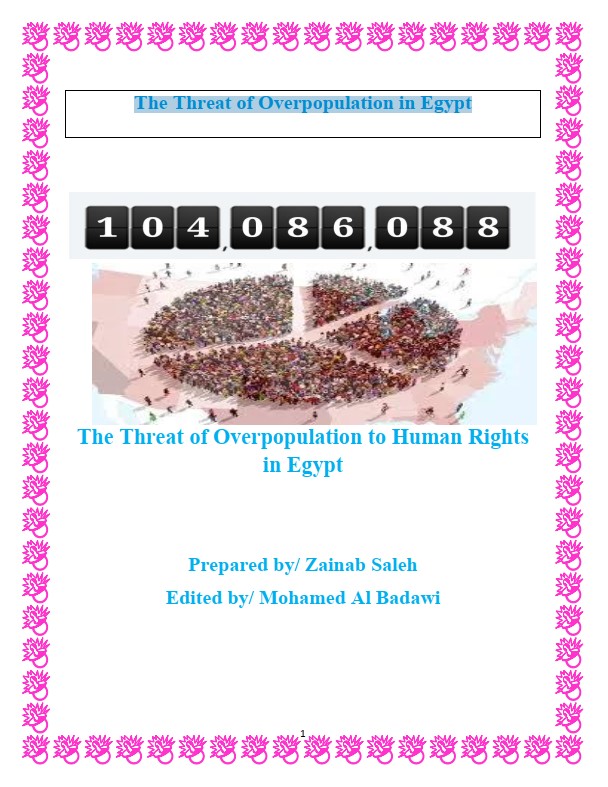Press Release
……………………………………………………..
Today, Wednesday 10/26/2022, The Forum for Development and Human Rights Dialogue (FDHRD) issues its report, which deals with the issue of population increase and its impact on citizen rights. The annual population increase exceeds 2.6 million citizens. This represents an enormous pressure and danger to the economic and societal development in the country. It also reduces the individual’s chances of benefiting from economic growth and erodes development revenues, which makes overpopulation a disaster that threatens the Egyptian state.
The report also stressed that Egypt, about 20 years ago, had an effective system for the family planning process. However, with a population exceeding 104 million people, today Egypt has become the first Arab country in terms of population, the third in Africa and the fourteenth in the world. Its population has reached about 104,086,088 people, according to the statistics of the year 2022, meaning that it is currently suffering from a large population increase that poses a major challenge to the state.
The population issue was discussed in the report by defining the overpopulation, identifying its causes, clarifying its effects on individuals’ access to their various rights, discussing the Egyptian efforts made towards the population increase crisis and presenting some proposals that must be taken into account to solve this big problem.
The report stressed that there are many reasons that lead to an increase in the population in Egypt, the most important of which is:
The increase in the number of births, which is one of the most important reasons leading to the increase in the population in Egypt, the decrease in the death rate, the unequal distribution of the population, migration, customs and traditions, early marriage, polygamy, the large number of divorces, the spread of illiteracy, especially among women, the neglect of family planning methods, the tight economic conditions of the country and political changes.
The report also dealt with economic impacts, community development, social problems, environmental impact, shrinking agricultural lands, lack of natural resources, food security and other resources, creation of an environment of wars and international conflicts, the emergence of epidemics, malnutrition, famine, water shortages, extinction of wildlife, the increasing demand for intensive agriculture and the impact of population increase on the electricity sector. The report also dealt with the Egyptian efforts made towards the population increase crisis.
The report also presented a set of recommendations, as follows:
- Developing an urgent, unified, and applicable strategy to control population growth rates, with evaluation and follow-up mechanisms, involving all relevant state institutions in its implementation, and paying attention to set “reducing the rate of population increase” as a national goal in which all state agencies cooperate in achieving it.
- Introducing legislative and legal articles that enable setting up a governing framework for policies to control population growth, especially with regard to determining the age of marriage.
- Bringing about a realistic demographic shake-up process to end the overcrowding of the population around the Nile Valley and its delta, and move to new cities that the state has established in recent years, which have reached 30 new cities with an area of 580,000 feddans, with a total investment of 690 billion pounds.
- Developing a clear policy to improve demographic characteristics in order to achieve maximum benefit from human capital in the process of sustainable development.
- Organizing an expanded media campaign through various media and social media, and drawing up a population media policy aimed at raising societal awareness about the dangers overpopulation and how to control the reduction in childbearing rates.
- Providing adequate and sustainable funding to ensure full coverage of contraceptive methods, making them available for free, and guiding women on how to use them.
- Improving family planning services provided to women. To achieve this, it is necessary to address the challenges in providing services and disseminating them in all governorates, and increase the number of doctors, especially women and nursing staff, training them to deal with women, and raising their awareness of the importance and methods of family planning.
- Encouraging civil society organizations to play a more effective role in providing services and advice in remote areas, and raising citizens’ awareness of the dangers of overpopulation.
- Adopting a comprehensive educational and cultural plan to correct misconceptions and social and religious beliefs about the concept of family planning, while ensuring that it does not conflict with religious and cultural values.
- Paying attention to, rural areas, the countryside, Upper Egypt, governorates and border cities, and provide them with health services, reproductive health and family planning.
- Paying attention to supporting women, providing them with education and health services, empowering them economically and providing them with job opportunities on an equal basis with men. Working women, according to studies and data, have fewer children and are more interested in educating their children than non-working and uneducated women.
- Conducting an accurate periodic survey of the overpopulation and its locations, and monitoring the population characteristics in order to make them available to the concerned authorities to study them in detail.
For his part, Saeed Abdel Hafez, Chairman of the FDHRD, stressed that the overpopulation at the present time constitutes a challenge for countries of all systems, whether developed or developing. There are facts that cannot be ignored about the population problem now because it affects the individual and society. Its dimensions have exceeded the regional borders to the global level until it has become obligatory for the international community to confront and address it, because of the danger it poses at all levels. The population explosion is the biggest challenge facing Egypt and hindering its progress. He called for the need to strongly confront the overpopulation crisis, and for all parties and citizens to unite to address the overpopulation.
Zainab Saleh, a researcher at the FDHRD, stressed that citizens should listen to the government’s directives regarding family planning and the sufficiency of two children per family to limit the population increase in Egypt. She stressed the need to adhere to these tips and take them into consideration for the benefit they bring to the Egyptian people and achieve development in society. It provides opportunities for citizens to enjoy more rights and prosperity. The crisis poses a great danger to any society and an obstacle to its progress, and many do not realize this.








